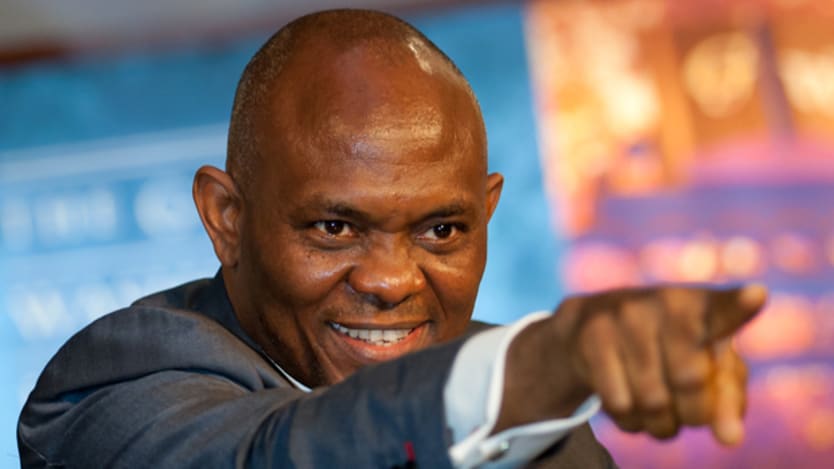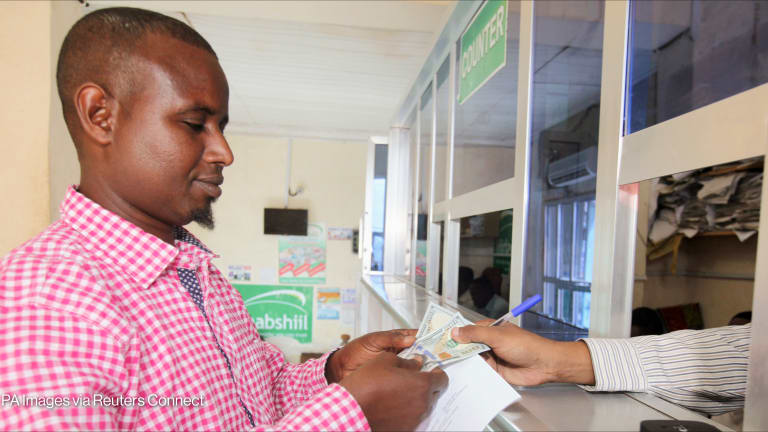
Global development leaders can’t seem to get enough of Tony Elumelu, the soft-spoken Nigerian banker and philanthropist who last year made headlines when he announced a $2.5 billion investment in U.S. President Barack Obama’s Power Africa initiative.
Elumelu isn’t just out to corner his country’s newly privatized energy market. He wants to change the way business and development are done in Africa and beyond.
To spread the message of “Africapitalism,” the Tony Elumelu Foundation plans to open an Africapitalism institute. To address Africa’s “management gap,” it is preparing a new “iconic, world-class business school” in Lagos. Within five years, the foundation wants to have worked in an impactful way with at least 500 entrepreneurs across Africa — the ultimate goal, says Wiebe Boer, the foundation’s inaugural chief executive officer, is to help 1,000 emerging African entrepreneurs build pan-African companies like Heirs Holdings, the one Elumelu built.
Within 10 years, Elumelu and his partners want to impact the lives of 10 million people through capacity building and the advocacy of business-friendly policies.
So what message is Elumelu spreading? Devex sat down with him recently for an exclusive interview.
What is the difference between good business practices and philanthropy?
We have a philosophy we call Africapitalism. It’s about the middle point between business and philanthropy. The world used to think to do well, you can’t do good. But we have come to realize — and I think a lot of people with a business background have — that there are better ways of impacting a huge number of people through business practices, not necessarily philanthropy.
We believe that the end point of philanthropy is to touch lives, and that business practices actually help to achieve the same purpose.
So we came up with the concept of Africapitalism, which is based on the realization that the private sector can play — should play — a key role in helping to develop the African continent.
We want to develop the African continent through long-term investments in key sectors — not all sectors, but those which can transform a society by creating prosperity that and social change.
How is it different from the charity model that some of your peers — and many other foundations — pursue?
We think that charity is good. However, we’ve seen Africa has a lot of challenges and we have tried to solve some of these issues through aid intervention. But we know today that we haven’t solved our issues.
So I’m saying: Can’t we begin to reassess and adopt a new way of doing things on the continent? Can’t we give charity in a manner whereby people who reach out to us today won’t come back in five years or 10 years and ask for the same thing?
There are some areas — flood disasters, for instance — where you must give charity. But I think the charity approach to solving other issues must be reassessed. It’s all about sustainability, it’s all about self-reliance. It’s catalytic philanthropy.
At the United Nations and elsewhere within the aid community, there’s been a lot of talk about multisector, multistakeholder partnerships. What’s your take on this?
I believe the private sector should lead, but the public sector must play its role in providing the right environment. Philanthropic partners should look at how to support the private sector so they can achieve their objectives of creating a better society, reducing poverty, addressing unemployment issues, addressing security challenges, etc. You need the private sector, you need government, you need multilateral agencies and other partners — you need them all if our overt intent is to create a better society, if you want to eradicate poverty.
All I’m saying is that in the 21st century, there are better ways of addressing poverty and other issues than the traditional approaches that have not helped. We’ve been fighting poverty for decades, and it’s still here. The Gini coefficient says poverty is now likely to go up. So, let’s look at different approaches to solving poverty. I support multistakeholder engagement to tackling challenges of the world.
Rwanda, for instance, has been at the top of the Better Business index for years for its efforts to improve the country’s investment climate. Is that the type of role you want government to play, or is that still not enough?
What is good for business is good for people. It will help us ultimately achieve the objective of creating a better society through initiatives that are truly transformative.
What would you like your legacy to be?
I’d like to see a much more developed Africa. I’d like to see an African continent that’s viewed because of its attractiveness to investors rather than a center for aid. I’d like to see an Africa where there’s less unemployment and extremism because there’s hope and there’s access to opportunities. That’s the kind of Africa I’d like to see.
To make that happen, we have to support entrepreneurs and make sure we’re capitalizing and encourage more entrepreneurs to invest in Africa, because we believe so much in our entrepreneurs, and entrepreneurship, as a key tool to transforming the continent.
You’ve pledged to invest $2.5 billion in Nigeria’s power sector as part of the Obama administration’s Power Africa initiative, which seems very much geared toward opening up markets in Africa for U.S. companies. What’s your take on this?
Africa needs power. We all know the benefits of access to electricity. So we, as committed citizens of the world, have to make sure that there’s access to electricity in Africa.
I believe that the quickest way to boost development is through energy. That is why I have invested in this area. And when [U.S. President Barack] Obama visited Africa [June 27-July 2, 2013] and launched the Power Africa initiative, it was a validation of what we already saw as a way to build Africa.
We believe that the Power Africa initiative, coupled with the Electrify Africa Act, [which is pending in the U.S. Congress] should help to a large extent to improve access to electricity on the African continent. I’d like to also call on African businesspeople who have the resources to invest in power.
Join the Devex community and access more in-depth analysis, breaking news and business advice — and a host of other services — on international development, humanitarian aid and global health.








